- Home
- Anne McCaffrey
Power Lines Page 9
Power Lines Read online
Page 9
Bunny scarcely heard his last words. As she picked her way forward in echoing darkness, she suddenly felt as if she couldn’t draw a breath, as if something inside her, a presence that she always had with her, was walled away from her, withering. The sudden terrible loneliness of being without that presence was crushing. She backed away, stumbling toward the sound of Diego’s voice.
He was still talking when she reeled against him, clutching at his jacket. “Bunny? Bunny! What’s wrong?”
“Dead,” she said. “It’s—dead. Out—gotta get—out!”
Alarmed, the boys helped her out of the cave. She sat down on the path, gulping to get air in her lungs. After a dozen deep inhalations of the cold wind she looked up at Krisuk.
“How can your people stand to go in there?” she demanded.
“Why? What’s wrong?”
“It’s dead, that’s what! Somehow that bastard has killed part of the planet.”
“How could he do that?” Diego asked.
“I don’t know.”
“I don’t much like the place,” Krisuk said, “and everybody else is uncomfortable there, too. I hear the songs about the joys of singing with Petaybee, and I remember when I used to love to come here, and I don’t understand it. I sort of put it down to Satok’s charming personality.”
Bunny shook her head. “It’s more than that. I’m surprised you didn’t feel it, too. Diego, did you?”
“Maybe,” he said, frowning thoughtfully. “When I was a kid one time, a ship hauled a derelict back to our station. They put it in the cargo bay. I wanted to see what it was like and I snuck in. I couldn’t get out of there fast enough. Was that what you felt?”
“I don’t know. Maybe.” Having escaped the suffocating sensation in the cave, she was too drained to describe it properly. The wind and icy rain were oddly comforting.
“I’m going back in there,” Diego said suddenly. “Krisuk, maybe you should stay with Bunny.”
“No,” the boy said. “I’ll go, too. It’s forbidden for any of us to go in without Satok’s say-so. Some who have disobeyed have never been heard from again. But if there’s any kind of proof in there that Satok’s not who he says he is, then my word will carry more weight than an outsider’s. I don’t think my folks would give up a second kid to that creep as easy as they let Luka go.”
“Will you be okay, Bunny?”
Dinah chose that moment to press her wet nose against Bunny’s ear and lick it.
“Yeah,” Bunny said slowly. “Maybe I could even go back in now that it wouldn’t take me so much by surprise.”
“I don’t think that’s such a good idea,” Diego said, eyeing Bunny’s pale face and eyes staring wide with shock and grief. “Besides, somebody should stand guard. I wish we had a light, though.”
“Oh, there’s lamps in there,” Krisuk said. “Come, I’ll show you.”
Bunny heard their voices grow fainter as they penetrated farther into the cave. Her fingers folded Dinah’s fur and stroked her soft, pointed ears. Dinah whined and laid her head in Bunny’s lap. Bunny felt like whining herself.
The little lamp threw the boys’ shadows into grotesque skeleton dances around the smooth walls of the cave room. It was a large room, but it stopped abruptly about forty feet from the entrance. “Has it always been this small?” Diego asked.
“No. There was this accident, oh, a couple of days before Satok came. It was the first latchkay we’d had here since old McConachie died. People were goin’ back into the place like we’d always gone, when all of a sudden there was what sounded like an explosion, and showers of rock and dust came spewin’ out after us. We all ran, but the first few people, McConachie’s family, his apprentice, they were all killed. I remember my da and the other men diggin’ for bodies. I was just a little kid then. I couldn’t understand where my friend Inny McConachie had gone. That was old Mac’s grandson, a good mate of mine.”
“That’s rough,” Diego said, feeling along the walls. “I lost a friend not too long ago, too.”
“The woman in the song?”
“Yeah. Wait a minute. What’s this?”
“What?”
Diego’s fingers dipped into a notch and a panel slid open; reaching out, his hands touched only empty space.
“How long did it take them to clean up the cave-in?”
“They didn’t. Nobody wanted to. When Satok came, he pretended to be real sympathetic and went in to look for bodies. He brought out a couple of pieces of clothing and insisted we all go back into the cave to give a proper memorial service. I don’t know why people went along with it. Guess everybody was kind of in shock. It’s got to be about the worst thing that ever happened here.”
“Not quite,” Diego muttered under his breath. “Bring the light over here.”
Krisuk did. The fumes from the mare’s-milk lamp stank, but the acrid odor was almost welcome in the sterility of the cave. As Krisuk raised the little lamp, it illuminated an area of clean stone floor and clean stone walls.
“There may’ve been a cave-in here,” Diego said with a snort, “but someone worked real hard to tidy it all away.”
“It can’t be!” Krisuk said. “The cave’s been blocked off for years. Nobody comes in here except with Satok. Everybody’s sort of afraid of the place.”
“That’s too bad,” Diego mumbled, the thought coming to him like a stray line of poetry. “It should be the other way around.”
“What?”
“Seems like the place had more reason to be afraid of the people—”
“What’s that supposed to mean?”
“I dunno. It just popped into my head.”
“Look, my people may be mistakenly following a sleazebag but I still don’t like them being insulted by an outsider . . .”
“Okay, okay. I didn’t mean anything by it. Come on, let’s see the rest.”
“There’s more?” Krisuk held the light up head high, advanced a step inside the new opening, and emitted a low whistle. “There sure is.”
Even in the weak light of the lamp they could see that a good-sized tunnel had been cleared through the cave-in. The floor still was mainly stone overlain with dust, but the walls and ceiling had an odd white sheen. Krisuk ran his fingers over it and sniffed. “No smell.”
Diego leaned in closer and dragged his fingernails down the wall, leaving not so much as a scratch in their wake. “No, there wouldn’t be. It’s bonded with Petraseal.”
“What’s that?”
“It’s what they use in mines these days to prevent cave-ins. They bond the rock surfaces to each other with this stuff. It’s very strong. Nothing gets through. I wonder where Satok got it in this quantity.”
“You think he did this?”
“Who else?”
The other boy gave a quavering groan. “Oh, no. I can’t believe he did this.”
“What?” Diego asked, peering in the direction Krisuk was looking with a transfixed stare. Then he saw the outlines of skulls, large and small, and all sizes and lengths of bones, jumbled in with the rock, like so many fossils.
“Bastard! He could have brought them out for a decent burial!” Krisuk said.
“Looks like they’re still half-crushed by the rocks,” Diego said fairly. “Maybe he couldn’t get them out without bringing down another cave-in. So he just sealed them up.”
“Without even a proper song?”
“You did say there was a memorial service for them in the cave.”
“Yes, but . . .”
“Look, I’m not trying to defend the guy, but the bonding wasn’t put on until they were already skeletons. My guess is that it took him a while to dig this out and seal it up. Would have had to. Come on, let’s see how far this goes.”
“I was only a tad, mind you,” Krisuk said, swallowing convulsively, “but it seems to me like the cave was really long. The floor sloped down because it was a hard walk up when we came back out: Mum used to have to carry me. I also remember that the cave used to hav
e little teeth farther on.” Krisuk pointed to the darkness ahead, beyond the reach of the light.
“You mean stalactites and stalagmites?” Diego asked.
“Pointy things dripping down from the ceiling or sticking up from the floor like anthills?”
“Yeah. I never saw an anthill like them, but you got the idea.”
They walked back farther, their footsteps at first scuffing on the grit across the floor, then sounding with a ringing echo as the floor, too, became coated with the Petraseal and metal grates had been placed along the corridor. For a time the floor sloped down, as Krisuk had remembered, but then another corridor, of fresh, jagged rock, still sharp through the sealant, branched off and twisted upward.
“That wasn’t there before!” Krisuk said and turned into the new passage.
Diego followed him up for a few feet, enough to see that the Petraseal covered the floor and from the ceiling dangled the roots of trees and bushes, preserved for all time in death-glossy bones.
Diego shuddered, in spite of himself. “This probably leads to Satok’s place, if he lives above the cave, like you said.”
“He did all this stuff?” Krisuk asked. “How could he?”
Diego shrugged. “It’s not that hard with the right tools. I just wonder where he got them. Come on. I’ll bet if we look further we’ll find out why he’s doing all this.”
They didn’t find out why, but they did find out what it was he was doing when they took the descending path into the lower cavern Krisuk remembered.
Lower, farther from the entrance, everything was not covered with the stone bonder. But where the stalactites and stalagmites had been were only round craters, and sometimes small tunnels, like the holes of giant snakes, burrowed deep into the rock walls.
When she was finally able to retire from the elaborate welcoming dinner Torkel Fiske had arranged, Marmion asked Faber to arrange transport for her the next morning to see Kilcoole from ground level.
“Ask Sally and Millard to see what they can hear round and about, too, would you, dear Faber?” she added, allowing herself the luxury of a yawn she didn’t have to stifle.
“Shall I pull rank if I run into obstruction?” Faber asked. He was a bird colonel, currently detached to her service on a long loan basis.
“Hmmm, I’d rather you saved that for later, if at all possible. Torkel did mention somewhere in the gabble at dinner that we could make use of any facilities we needed in our investigations. So we will.”
She was up and out at what would have been considered by many of her peers an obscenely early hour. She wasn’t as surprised to see Whittaker Fiske as he was to see her emerging from her apartment.
“Why, Whit, what on earth are you doing up at this hour?”
He chortled. “The question applies more to you than me, Marmie.” He bowed gracefully over her hand with a real skin-touching kiss. “Early birding?”
She smiled, and the arrival of Faber driving the antiquated rattletrap 4x4 vehicle spared her the necessity of replying to the obvious.
“Can we give you a lift?” she asked.
“Depends on where you’re bound.”
“Kilcoole. Didn’t see very much from the air yesterday, and it seems the best place to start.”
Whit cocked his head at her, laugh lines crinkling at the corners of his amused eyes.
“It’s safe today,” he said, handing her up the first high step to the passenger seat.
“Oh, your leg!” Marmion said, starting to get down.
“Don’t mind me.” Opening the rear door, he agilely swung himself into the back.
“What’d you mean by ‘it’s safe today,’ Whit, dear?” Marmion asked as she snapped on her seat belt and Faber pulled the vehicle away.
The ride was going to be bumpy over the mangled plascrete, but later she would have exchanged that for the slip and slide of the mud-track to Kilcoole.
“Ah, well, Matt had his boys up before breakfast, scurrying about the place, accessing all kinds of records and reports so he’d ‘have the overall picture and the demographic levels’ and stuff like that.” Whittaker snorted. “No chance of your running into him today out at Kilcoole.”
Marmion smiled. She had hoped to do her research first without stumbling over those physically fit types. As the vehicle hit a particularly large bump, she clung to the handle above her head. She could feel Whittaker taking a firm grip on the back of her seat.
“Should still be able to use snockles this time of year,” Faber said. “Thaw caught everyone off guard.”
“So much so,” Whit said with a chuckle, “that no one came close to winning the Pool.”
“The Pool?” Marmion asked, clinging tightly to her handle.
“The betting pool the locals have on when the river breaks up. The thaw was so early this year it took everyone by surprise. See?” he said, pointing to the river at their left, where soldiers were working at the water’s edge. “Still retrieving sunk snockles from their watery grave.”
From what Marmion could see as they drove by, the soldiers were having trouble: the tires of the tow truck were slipping on the muddy bank, unable to find enough traction to pull the vehicle on the end of its cable out of the fast-running river.
“Faber,” Whit said, leaning forward to point over the driver’s shoulder to the woods, “see that opening? I’d take that route were I you. Make much better time. I usually walk.”
Both Marmion and Faber were happy they’d taken his advice, for the narrow track gave a much smoother ride than the churned mud by the river.
“Oh, it is pretty here,” Marmion said, breathing in the rich damp-earth smells. “Trees are budding out!” she added in exclamation. “Almost overnight it seems.”
“I don’t think Petaybee’s keeping to schedule this year,” Whittaker said, sounding enormously pleased with himself. “I’d advise you to do the same, Marmie. You’ll get where you’re going faster.”
“Then where do you advise I go first, Whit?”
“Where I am,” he said, sitting back. “Just keep on this track, Faber, and when you reach the town, hang a right.”
Kilcoole, despite its mountains of once-snow-covered paraphernalia, had an air of desertion. Marmion remarked on it, nobly refraining from commenting on its appearance.
“Oh, a lot of folks have taken advantage of the thaw to visit relatives and exchange garden plants.”
“How wise. They’re ahead of schedule, too?”
“They did get the hint. And don’t be misled by all the stuff you see outside, Marmie. No one throws anything away that might be useful.” He pointed to several lads who were carefully moving machinery parts in the side yard of one house, obviously looking for a particular one.
Marmie caught their running commentary as the vehicle rolled by: “I know it was here ‘fore the first snow. And I know it was at this end.” “Well, my father was looking for stuff, and he might have just pulled the pile to pieces looking. You know how he is.” “Then try underneath.”
Faber braked suddenly as a trio of orange-striped cats jumped out in the middle of the road just ahead of them.
“My word, do they often commit suicide that way?”
“My fault,” Whit said sheepishly. “Shoulda told you to stop at that house on the left. That’s where I’m working and where you should start.”
“But if you’re working there, Whit, I don’t want to intrude . . .”
“I’m working outside, Marmie,” Whittaker said, opening the door of the vehicle. The cats emerged from under the ancient 4x4, prrrowing to him; two of them propped front paws up on his knees to be petted. The third spoke to him, then turned to wait at the passenger door. “You’re invited inside,” he added. “That’s good, believe me.”
“I’m always agreeable to invitations,” Marmion replied, signaling for Faber to descend, as well. “What a marvelous shade of orange,” she said directly to the cat. When it turned, tail tip idly swaying high above its body, she followed. “Mir
andabelle Turvey-West would give her eyeteeth for a hair dye that shade, just wouldn’t she!” she murmured under her breath.
The cat shot up the muddy steps. Marmion, eschewing Faber’s outheld hand, managed to place her booted feet carefully in the drier spots.
The door opened as they reached the porch and one of the largest, most impressive-looking women Marmion had ever seen, with a complexion to die for and a smile that was the most beautiful thing so far about Kilcoole, stood in the opening.
“Sláinte, Whittaker, Miz Algemeine, Colonel Nike, grand morning for a ride, is it not? I’m Clodagh Senungatuk. I’m that pleased to meet you. Come in. I’ve fresh coffee and some decent baking just out of the oven.”
Warmed by the welcome, Marmion held out her hand, to have it briefly but kindly shaken and given back, slightly floured. Then Faber was met with the same cordial treatment.
“The new shingles got here first light, Whit,” Clodagh said, “but you’ve time for a bite and a sup first.”
“Hey, that’s good,” Whit said with more enthusiasm than Marmion remembered him showing. “I can probably finish the roof today. Maybe I’ll just get started, Clodagh, and grab a bite later.”
With a nod to the other two, he tramped to the edge of the porch and hopped off. A brief explosive exhalation reached the others.
“Leg’s not good enough yet to be jarred by leaping as if he was young again,” Clodagh said, tsking-tsking as she shooed her bemused guests inside.
Marmion’s first shock at the interior dissolved with the scent of spicy warm bread and her instant realization that this small home—and home it definitely was—was actually highly organized and astonishingly neat if you looked past what might be cursorily dismissed as “clutter.” There were, however, more cats inside who, one after the other, strolled over to make personal evaluations of the newcomers.

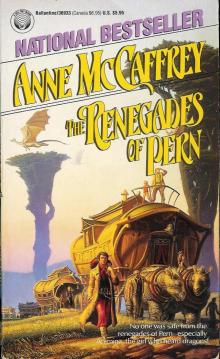 The Renegades of Pern (dragon riders of pern)
The Renegades of Pern (dragon riders of pern)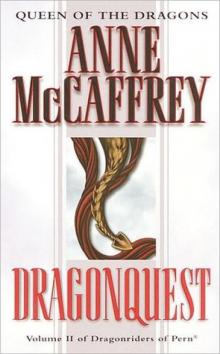 Dragonquest
Dragonquest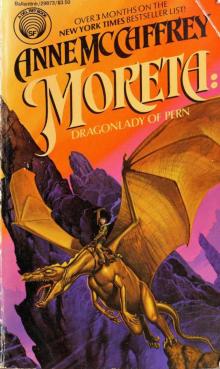 Moreta (Dragonlady of Pern)
Moreta (Dragonlady of Pern)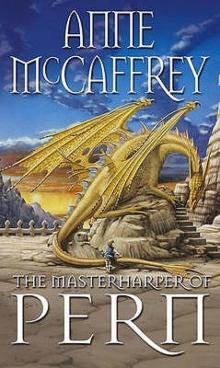 The Masterharper of Pern
The Masterharper of Pern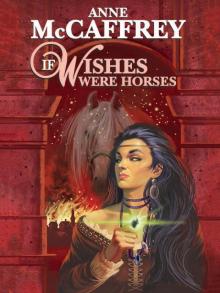 If Wishes Were Horses
If Wishes Were Horses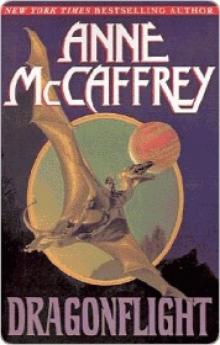 Dragonflight
Dragonflight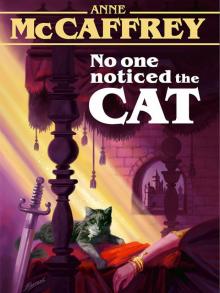 No One Noticed the Cat
No One Noticed the Cat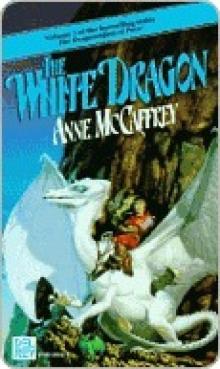 The White Dragon
The White Dragon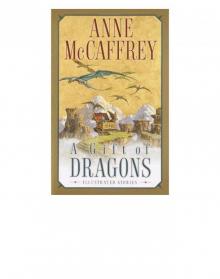 A Gift of Dragons
A Gift of Dragons Harper Hall - Dragonsong
Harper Hall - Dragonsong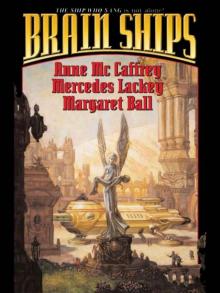 Brain Ships
Brain Ships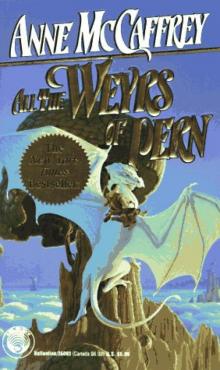 All The Weyrs of Pern
All The Weyrs of Pern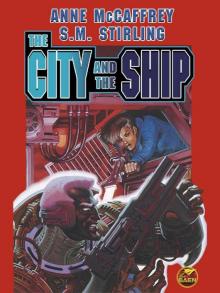 The City and the Ship
The City and the Ship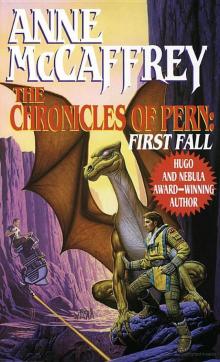 The Chronicles of Pern: First Fall
The Chronicles of Pern: First Fall Acorna’s Search
Acorna’s Search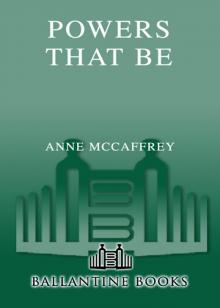 Powers That Be
Powers That Be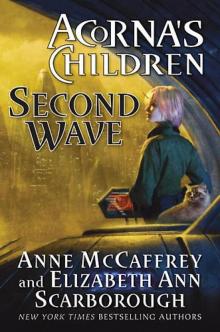 Second Wave
Second Wave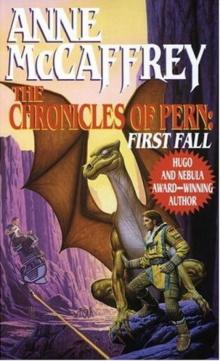 Chronicles of Pern (First Fall)
Chronicles of Pern (First Fall)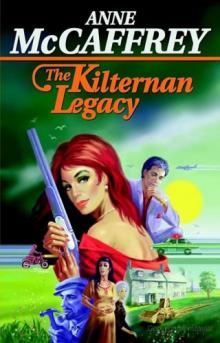 The Kilternan Legacy
The Kilternan Legacy Decision at Doona
Decision at Doona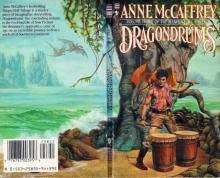 Dragondrums (dragon riders of pern)
Dragondrums (dragon riders of pern)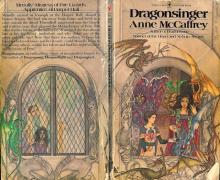 Dragonsinger (dragon riders of pern)
Dragonsinger (dragon riders of pern)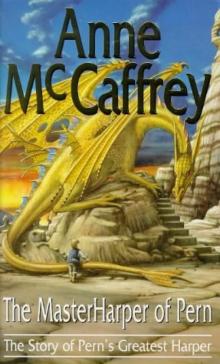 The Master Harper of Pern
The Master Harper of Pern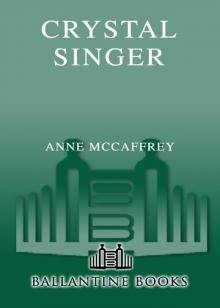 Crystal Singer
Crystal Singer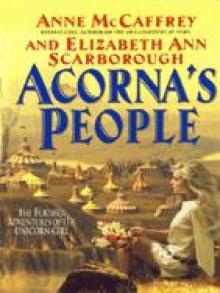 Acorna’s People
Acorna’s People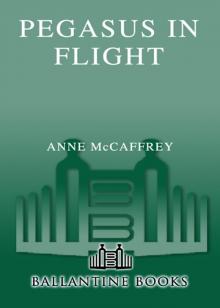 Pegasus in Flight
Pegasus in Flight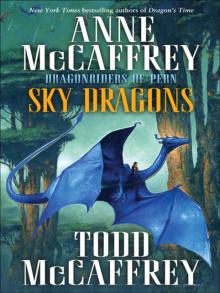 Sky Dragons Dragonriders of Pern
Sky Dragons Dragonriders of Pern Dragonriders of Pern 4 - Dragonsinger
Dragonriders of Pern 4 - Dragonsinger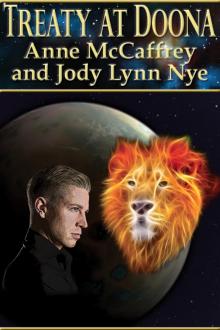 Treaty at Doona
Treaty at Doona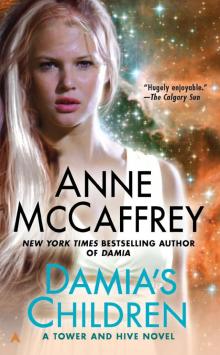 Damia's Children
Damia's Children Stitch In Snow
Stitch In Snow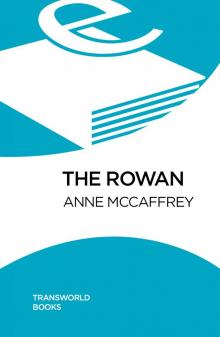 The Rowan
The Rowan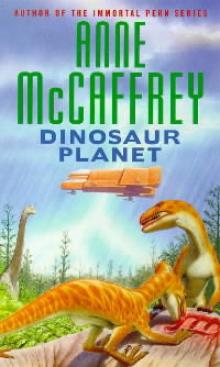 Dinosaur Planet
Dinosaur Planet The Year of the Lucy
The Year of the Lucy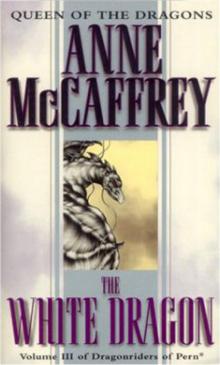 The White Dragon p-4
The White Dragon p-4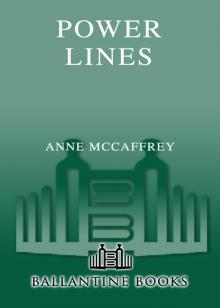 Power Lines
Power Lines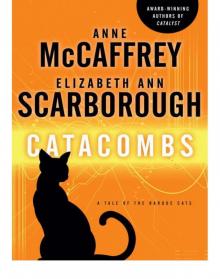 Catacombs
Catacombs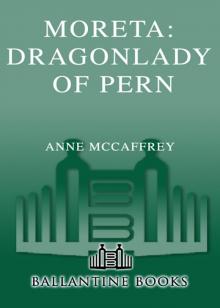 Moreta
Moreta Dragonsinger
Dragonsinger Crystal Line
Crystal Line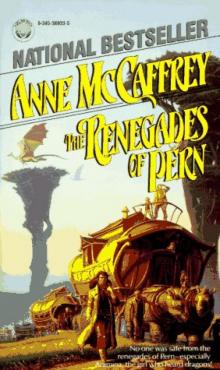 The Renegades of Pern
The Renegades of Pern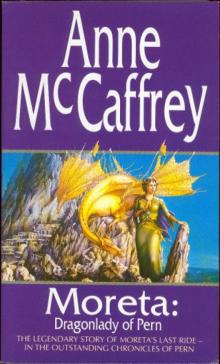 Moreta - Dragonlady of Pern p-8
Moreta - Dragonlady of Pern p-8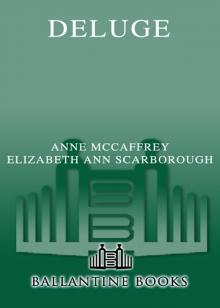 Deluge
Deluge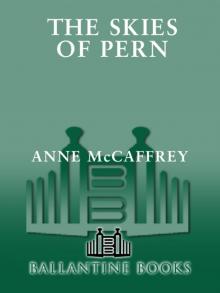 The Skies of Pern
The Skies of Pern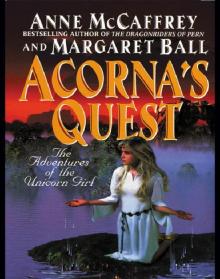 Acorna's Quest
Acorna's Quest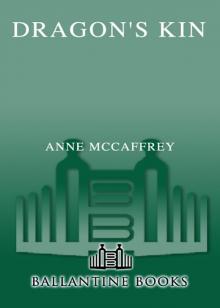 Dragon's Kin
Dragon's Kin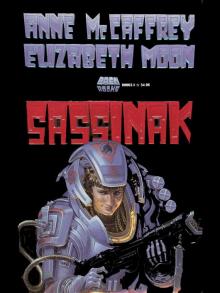 Sassinak
Sassinak![Crystal Universe - [Crystal Singer 03] - Crystal Line Read online](http://i1.bookreadfree.com/i1/03/31/crystal_universe_-_crystal_singer_03_-_crystal_line_preview.jpg) Crystal Universe - [Crystal Singer 03] - Crystal Line
Crystal Universe - [Crystal Singer 03] - Crystal Line Freedom's Landing
Freedom's Landing Acorna’s Quest
Acorna’s Quest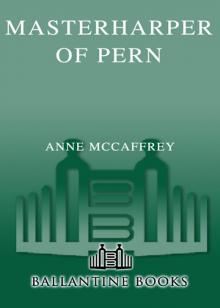 Masterharper of Pern
Masterharper of Pern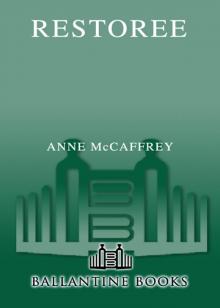 Restoree
Restoree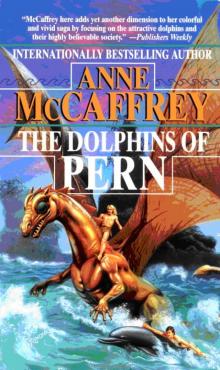 Dolphins of Pern
Dolphins of Pern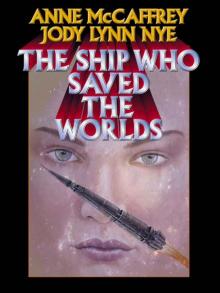 The Ship Who Saved the Worlds
The Ship Who Saved the Worlds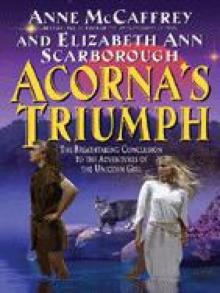 Acorna's Triumph
Acorna's Triumph Acorna's Rebels
Acorna's Rebels![[Acorna 08] - First Warning: Acorna's Children (with Elizabeth Ann Scarborough) Read online](http://i1.bookreadfree.com/i1/04/06/acorna_08_-_first_warning_acornas_children_with_elizabeth_ann_scarborough_preview.jpg) [Acorna 08] - First Warning: Acorna's Children (with Elizabeth Ann Scarborough)
[Acorna 08] - First Warning: Acorna's Children (with Elizabeth Ann Scarborough)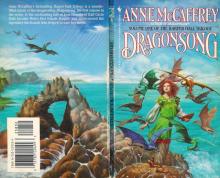 Dragonsong (dragon riders of pern)
Dragonsong (dragon riders of pern) Dragonriders of Pern 6 - Dragondrums
Dragonriders of Pern 6 - Dragondrums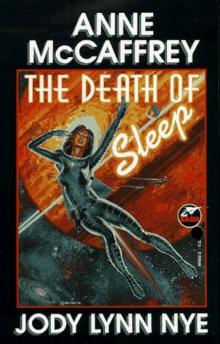 The Death of Sleep
The Death of Sleep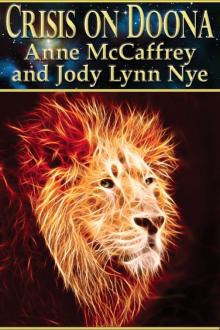 Crisis On Doona
Crisis On Doona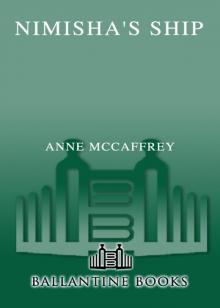 Nimisha's Ship
Nimisha's Ship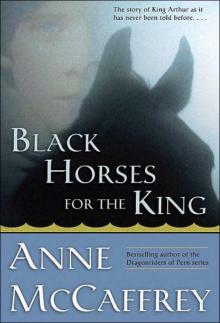 Black Horses for the King
Black Horses for the King Changelings
Changelings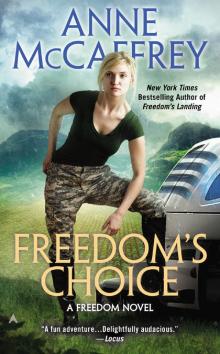 Freedom's Choice
Freedom's Choice The Lady
The Lady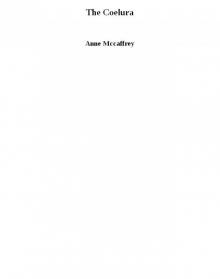 The Coelura
The Coelura Catalyst
Catalyst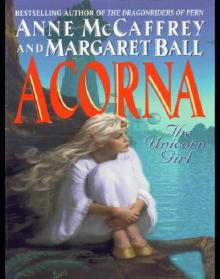 The Unicorn Girl
The Unicorn Girl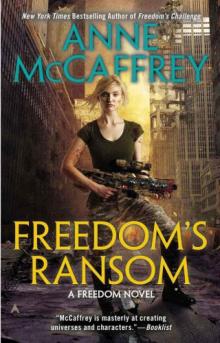 Freedom's Ransom
Freedom's Ransom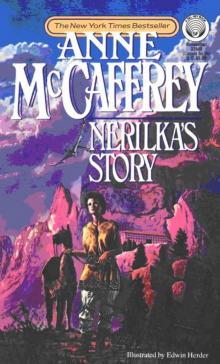 Nerilka's Story
Nerilka's Story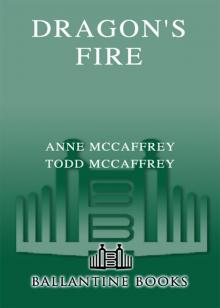 Dragon's Fire
Dragon's Fire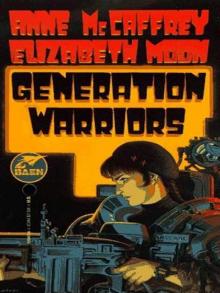 Generation Warriors
Generation Warriors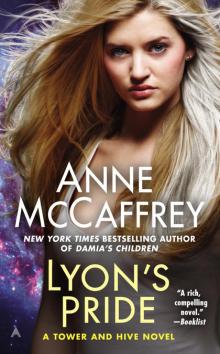 Lyon's Pride
Lyon's Pride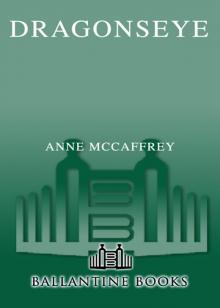 Dragonseye
Dragonseye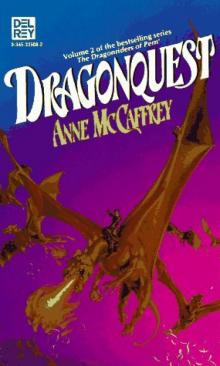 Dragon Quest
Dragon Quest Dragondrums
Dragondrums Dragonsong
Dragonsong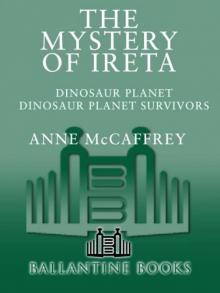 The Mystery of Ireta
The Mystery of Ireta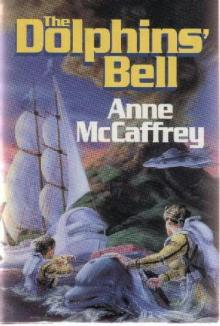 Dolphins' Bell
Dolphins' Bell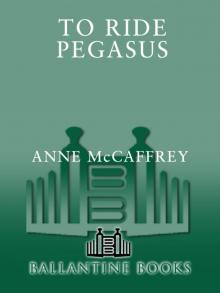 To Ride Pegasus
To Ride Pegasus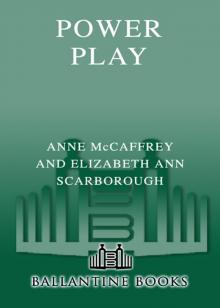 Power Play
Power Play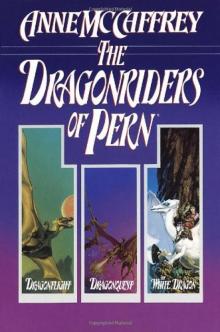 The Dragonriders of Pern
The Dragonriders of Pern An Exchange of Gifts
An Exchange of Gifts The Ship Who Sang
The Ship Who Sang Sky Dragons: Dragonriders of Pern
Sky Dragons: Dragonriders of Pern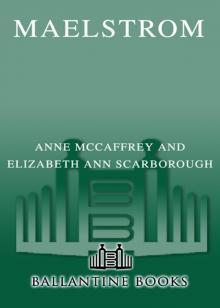 Maelstrom
Maelstrom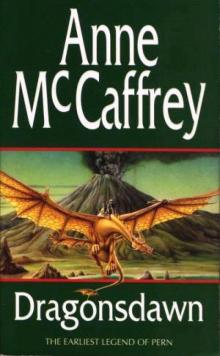 Dragons Dawn
Dragons Dawn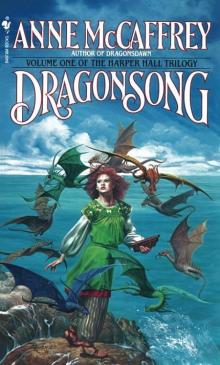 Dragon Song
Dragon Song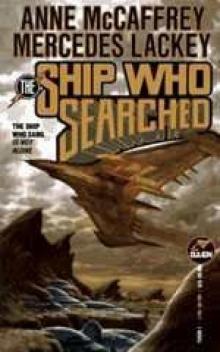 The Ship Who Searched b-3
The Ship Who Searched b-3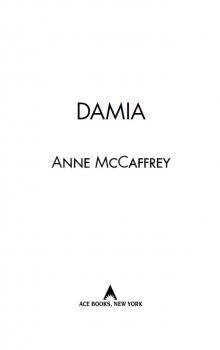 Damia
Damia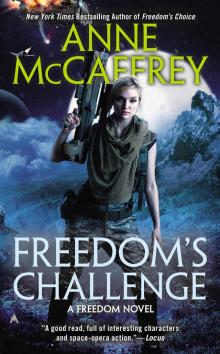 Freedom's Challenge
Freedom's Challenge